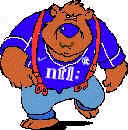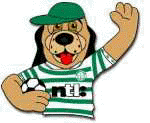|
A Billy
or a Dan
|
|
|
Page
1
|
Page 2
|
Page 3
|
Page 4
|
Are you a Billy or a Dan,
a Protestant or a Roman
Catholic, a bluenose or a jungle
jim,
a hun or a tim, a proddie
or a fenian, a Rangers
man or a Celtic man, dae ye kick wi yer right
foot or yer left foot, or the best one a
remember from my schooldays ...are you a pie or
bridie !!
I was at a dance many years ago when a man leaned over to his missus and
said "Big Tam's wife's a Shettleston Harrier" Oh said
his missus "she disnae look like a runner " ( Shettleston
Harriers being the local running club) "Naw! Naw!" he
said...." Shettleston Harrier...a tarrier!"
[ Tarrier being another term used for labeling someone who is a Roman
Catholic. In this case letting the company know watch your Ps & Qs, no
offensive jokes ]
.
Or the wee quiet nudge and dig, then a whisper in the ear..." he's
no' wan ae us "
..
|
Aye ......are you a Billy or
a Dan ?
I am sure everyone from Brigton and everyone from Glasgow knows
and has heard that question.
It matters not a jot to me now, older, wiser.......we are all Jock Tamson's
bairns etc.
But as a young boy brought up and living in Bridgeton, my memories are ..yes
we were Billy's or Dan's
I had a great wee pal, we played every day together, then came the time
to go to school, we were both five...I crossed the road to the local school
he walked the other way to a different school.
Mmmm we both thought...he's no wan ae us!. Thankfully it didn't
affect our friendship we walked about together wearing our teams colours Rangers
and Celtic..as children....later on of course
it got a bit more serious.
The local Primary schools used to meet at dinner time to throw bricks
at each other, groups and cliques were formed and often your religion
determined which group or clique you joined.
.
|
 
There are Rangers and Celtic
Pubs, there is even one
pub in Bridgeton, where the Protestants used to
stand
at one side of the bar and the Roman Catholics the other side......no trouble
just banter!
The morning after the battle o the Boyne, King Billy
comes across King James crying his eyes oot. "Whits wrang wi ye
Jimmy" Billy says. "Whit dae ye mean, ye gave us a right tankin
yesterday" "och" said Billy "don't worry aboot it,
it'll all be blown over by the morning!
|
.
You leave school, start work and the foreman asks "are a Billy
or a Dan ?
........right you come wi me the other boy, Paul, he can go wi Mick!"
It later turned out that the best education I received was at
work. Meeting people from all backgrounds and creeds ...you quickly
realise, who you get on with and who you don't get on with, has nothing to
do with whose the Billy, or whose the Dan.........
|
|
. |
|
Aye dae ye kick wi yer right
foot or yer left foot ?
Why are Roman Catholics sometimes called
'left-footers' and Proddies 'right-footers'?
THE answer lies in the rich folklore of the humble spade - and provides a
good illustration of the inadequacy of calling a spade 'a spade'. The saying
turns on a traditional distinction between left- and right-handed spades in
Irish agriculture. It has been used as a figure of speech and often, sadly,
as a term of abuse to distinguish Protestants from Roman Catholics: 'He digs with
the wrong foot.'
Most types of digging spade in Britain and Ireland have foot-rests at the
top of their blades; two-sided spades have foot-rests on each side of the
shaft and socket, while an older style of one-sided spade had only one.
Two-sided spades may well have been introduced by the Protestant 'planters'
in the sixteenth century. By the early nineteenth century specialised spade
and shovel mills in the north of Ireland were producing vast numbers of
two-sided spades which came to be universally used in Ulster and strongly
identified with the province.
One-sided spades with narrow blades and a foot-rest cut out of the side of
the relatively larger wooden shaft continued in use in the south and west.
The rural population of Gaelic Ireland retained the Roman Catholic faith and
tended also to retain the one-sided spade and 'dig with the wrong foot'. In
fact, the two-sided spade of Ulster was generally used with the left foot
whereas the one-sided spade tended to be used with the right foot.
Instinctively, the 'wrong foot' of the Roman Catholics has come to be thought of
as the left foot.
The figure of speech has now been extended to kicking with the wrong foot.
. |
|
......are you a Billy or
a Dan ?
( were the 'Dan' derived from )
Anyone who knows the history of green
and blue must be aware that both clubs were indeed good friends for the
first decade of their history, hence Old Firm; that Rangers signed
Roman Catholics at first; and that the chief rival for both of them in their
early days was Clyde FC.
It was really only in the early 1900s when Billy and Dan from
Ulster moved to Glasgow and took a hand - egged on by an anti-Catholic
press, it should be said - that the sectarian chasm opened up.
(This article refers Ulster Irish
incomers, Billy as a proddy name and Dan as a Catholic name - it may be
as simple as that.)
------------------------------------------------------------------
DAN,
prop.n. A nickname for a Roman Catholic (Gsw. 1975). Also Danny boy,
after the well-known song (wm.Sc. 1975). *Gsw. 1958 C. Hanley
Dancing in Streets 22:
A Billy or a Dan or an auld tin can?
[Familiar form of Daniel, a common name among Roman Catholic Irishmen]
=========================================================
Many however believe the reference to
Roman Catholics as 'Dan' comes from
Daniel O'Connell, known as "the Liberator," He was born on
6 August 1775 near Cahirciveen in County Kerry and was educated in
France because as a Roman Catholic he was unable to go to University in
Britain. He returned to Ireland, studied law, and was admitted to the
bar in Dublin in 1798.
He built up a highly successful practise as a
lawyer and dealt with many cases of Irish tenants against English
landlords. During the next two decades he was active in the movement
to repeal British laws that penalized Roman Catholics because of their
religion. Catholics were barred from Parliament but O'Connell became the
leader of the battle to win political rights for Irish Roman Catholics.
In 1823 he organised the Catholic Association, which played an important
role in the passage of the
Catholic Emancipation Act in 1829. As head of the Catholic
Association he received a large annual income from voluntary
contributions by the Irish people (the Catholic Rent of 1d a month) who
supported him in a series of demonstrations in favour of Irish Home
Rule.
. |
Bigot ?
Pastor Glass's enemies branded him a "bigot", but he gloried in the
description: "In the days when Protestants were burnt alive by Roman
Catholic priests, the reformer would say: 'By God's grace we will not give
in to false religion. By God's grace we will stand for Jesus and contend for
the faith'," Pastor Glass explained. "Papists started to call them bi-Godites.
Over time it became bigot. This is not a badge of shame he said." |
.
|
We somehow went tae separate schools, the Catholics
and Proddies and different rules.
They brought us up tae take a side, Celtic or Rangers but never the Clyde.
It was in the playground they set the scene, if you wur Orange or if you wur
Green.
To remain impartial you hadn't a hope.....if it wisnae King Billy it wis the
Pope!
Extract from the book
'Oot
the windae'
|
.
There is nothing surer to evoke Glesca folk than .....are ye a Billy
or a Dan.
Witness
extracts from my
GlesgaPals Message board..........click
car

|
.
|